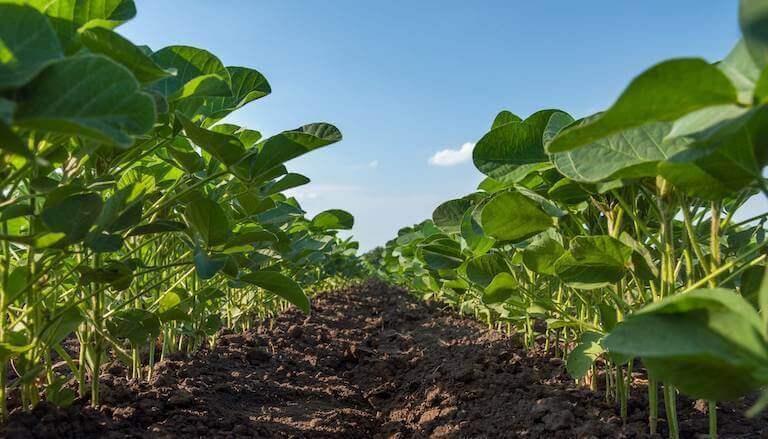Plant Sciences Institute Welcomes Four New Faculty Scholars in Third Cohort
Posted Jan 20, 2022

Posted Jan 20, 2022

The Iowa State University Plant Sciences Institute recently completed its third Faculty Scholars cohort, welcoming four additional Iowa State researchers to a roster currently comprised of 25 active faculty members.
The PSI Faculty Scholars program, which began in 2015, is open to PhDs with tenure-track positions of assistant professor or higher at Iowa State. It is intended to identify, support and empower talented university researchers who have the potential to significantly contribute to the complex and rapidly emerging discipline of predictive plant phenomics. Predictive phenomics is the science of understanding the effects of genetics and environment on phenotypes (traits) sufficiently well to be able to predict phenotype of a given genotype in a given environment.
PSI Faculty Scholars utilize innovative approaches to capitalize on traditional Iowa State strengths, including plant breeding/crop improvement, crop genetics/genomics, bioinformatics, statistics and engineering as well as emerging research in massive data integration and predictive modeling.
“The PSI Faculty Scholar program is critical for helping Iowa State maintain and strengthen its national reputation as a leader in plant science research,” says PSI director Patrick Schnable. “The research efforts spearheaded by PSI Faculty Scholars offer important new biological insights, develop new methods for analyzing phenomics-related data sets and create new measurement tools that deepen our understanding of the relationships that exist between genotype, the environment and phenotypic expression.”
Each new PSI Faculty Scholar will receive $75,000 of funding per year for up to three years to support their research efforts. The four researchers named PSI Faculty Scholars in the third cohort include:

Dutta’s research interests include spatial analysis, machine learning, high-dimensional methods for biological data and predictive plant phenomics. Dutta is working to develop methods and fast matrix-free computations for big data that arise from field trials, gene sequencing, and high-throughput plant phenotyping.
Modern advances in technology have facilitated the rapid and cost-effective collection of data from agricultural experiments. These data include both phenotypic measurements on plants and their genotypic information as well as meteorological and other environmental variables. Often these data are high-dimensional and have complex dependent structure, presenting substantial challenges for statistical analysis and predictive modeling.
Dutta’s research group has been developing new statistical methodologies that take into account the biological and environmental information and adjust for spatial and other nuisance sources of variabilities in order to enhance the scientific understanding of complex biological traits as well as increase the accuracy of phenotypic predictions. Specific projects include developing high-dimensional regression methods for genome-wide associations with non-Gaussian responses, deciphering the relationships among multivariate phenotypic traits, and improving the genotype-and-environment inference using spatial adjustments.

Qiu’s interests include high-dimensional data analysis and applications in genetic and phenomic studies, causal inference for genetic association studies, and analysis for high-throughput phenotyping data.
High-throughput phenotyping technologies provide large scale image data for plant growth. One area of Qiu’s research focuses on building a computation and analysis pipeline for high-throughput phenotyping data. The pipeline performs pre-processing for image data, extracts plant traits and conducts data cleaning in an automatic and efficient way. Another research area is to explore the relationship between plant traits, genetic variables and environmental factors through high-dimensional analysis, and build predictive models for plant growth dynamics.

Krishnamurthy has courtesy appointments in Electrical and Computer Engineering and Human-Computer Interaction at Iowa State. His research interests include geometric modeling, biomechanics, geometric machine learning, computer-aided design (CAD), cybermanufacturing, finite element analysis, and parallel GPU computing. Krishnamurthy is also a member of the AI Institute for Resilient Agriculture (AIIRA), an NSF- and USDA-funded institute that was launched in 2021 and is housed at Iowa State.
Krishnamurthy’s collaboration with PSI will focus on creating novel computational methods and tools to geometrically model different plants and develop advanced multiscale methods to model the utilization of environmental resources (sunlight, fertilizer, water, etc.) and gauge their impact on plants. The data from these simulations will provide valuable feedback to plant breeders to assist them in developing more resilient and productive crops.

Dai’s research focuses on developing statistical methods for analyzing complex data objects generated across science and engineering, specifically, functional and longitudinal data that are measured over space or time, as well as geometrical data such as directions and shape. He has extensive collaborative experience modeling these types of data, both with Iowa State scholars in plant phenomics, remote sensing, kinesiology, and with outside collaborators in developmental neuroscience.
Using analytic toolkits that he has developed, Dai will investigate problems involving geometrical data such as 2D and 3D orientations of leaves and roots and the plant ionome (the mineral nutrient and trace element composition of an organism or tissue). This research will integrate function-valued traits, longitudinal measurements and geometrical data in predictive phenomics to reveal valuable information that might otherwise go undetected.
The work and contributions of these and all the previous PSI Faculty Scholars is more critical than ever, according to Iowa State University Vice President for Research Peter Dorhout.
“Meeting the food needs of a growing population, confronting a changing climate on a planet with finite resources, is one of the greatest challenges of the 21st century,” Dorhout said. “The Faculty Scholar program is a tremendous platform that enables the Plant Sciences Institute to bring together innovative thought leaders from across the Iowa State campus with a common goal of discovering better, more intelligent crop performance solutions for making our world more food secure and more sustainable.”